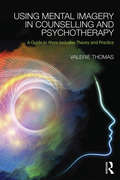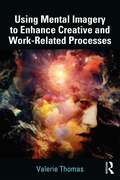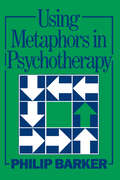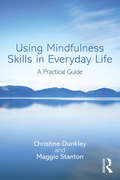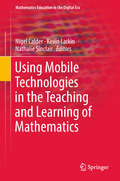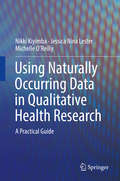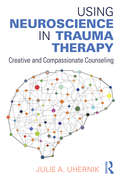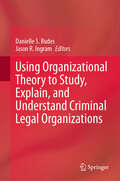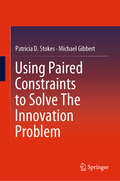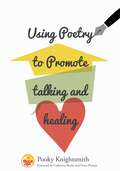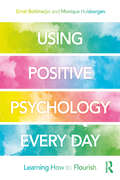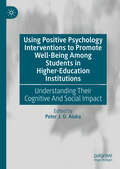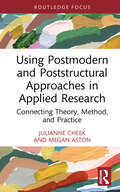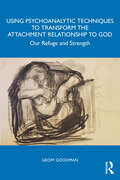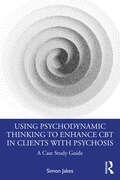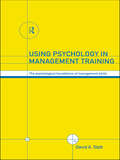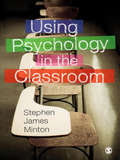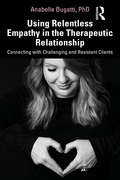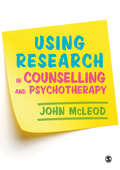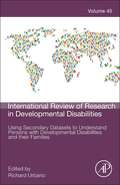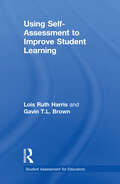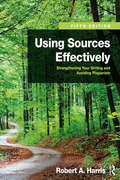- Table View
- List View
Using Mental Imagery in Counselling and Psychotherapy: A Guide to More Inclusive Theory and Practice
by Valerie ThomasThe therapeutic potential of working with clients' mental images is widely acknowledged, yet there is still little in the counselling and psychotherapy literature on more inclusive approaches to the clinical applications of mental imagery. Using Mental Imagery in Counselling and Psychotherapy is a unique, accessible guide for counsellors and psychotherapists who wish to develop their expertise in this important therapeutic practice. Contemporary practitioners have at their disposal a large repertoire of imagery methods and procedures comprising the contributions from different therapeutic schools and clinical innovators. Valerie Thomas identifies some of the common features in these approaches and offers a transtheoretical framework that supports integrative practitioners in understanding and using mental imagery to enhance therapeutic processes. The book: Examines the development of the theory and practice of mental imagery within a wider context of the history of imagination as a healing modality; Describes the different ways that mental imagery has been incorporated into therapeutic practice and evaluates recent developments; Reviews explanations of the therapeutic efficacy of mental imagery and considers how recent theoretical concepts provide a means of understanding the role that mental images play in processing experience; Includes reflections on ways to develop more inclusive theory and proposes a model that can inform integrative practice. Using a wide range of clinical vignettes to illustrate theory and cutting-edge research, Valerie Thomas proposes a new integrated model of practice. Providing clear and detailed guidance on applying the model to clinical practice, the book will be essential reading for psychotherapists and counsellors, both in practice and training, who wish to harness the therapeutic efficacy of mental imagery.
Using Mental Imagery to Enhance Creative and Work-related Processes
by Valerie ThomasIn Using Mental Imagery to Enhance Creative and Work-Related Processes, Valerie Thomas explores the productive use of mental imagery skills to engage with the processes of creativity. Practical and original, the book offers detailed guidance for a highly effective method that can provide rich insights into the development of a range of creative enterprises, including artistic and work-related projects. In this accessible and innovative book, Thomas pays equal attention to the theory and application of mental imagery. First, she explains how imagination-based methods have been developed and theorised within the discipline of creative behaviour, especially with regard to dual-processing theories of creativity. The book then considers mental imagery as a dialogical method informed by contemporary post-Cartesian theories of embodied cognition that reprise an earlier premodern understanding of imagination as a mediator between body and mind. Thomas introduces a particular approach to mental imagery that, informed by a functional research-informed framework (the Interactive Communicative model of mental imagery), can be applied very effectively to creative processes. The second half of the book provides detailed guidance on how to apply this particular method and is copiously illustrated with case vignettes. It includes chapters on using imagery theorised as conceptual metaphors such as the plant image for representing creative capabilities and the building image for representing creative and work-related projects. It also explains how to use imagery to represent and work with the conceptual processes of undertaking qualitative research projects. This original and wide-ranging book advances the scope and use of creative image-work in diverse settings. It will be an essential resource for everyone who is interested in developing their own mental imagery skills for creative real-world applications and for all professionals such as coaches, therapists and research educators who want to facilitate creativity in others.
Using Metaphors In Psychotherapy
by Philip BarkerPublished in the year 1982, Using Metaphors in Psychotherapy is a valuable contribution to the field of Psychotherapy.
Using Mindfulness Skills in Everyday Life: A practical guide
by Christine Dunkley Maggie StantonIn the last decade, more mental health treatments have begun to incorporate mindfulness as a skill to help people with their problems. Despite this, not everyone is sure how to incorporate mindfulness effectively into their daily lives. Giving simple explanations, examples and exercises, Using Mindfulness Skills in Everyday Life shows clearly how this is done. The book, written by two NHS clinicians experienced in teaching mindfulness, takes a down-to-earth approach, providing straightforward answers to the most commonly asked questions. The authors give definitions of mindfulness and guide people through instructions on how to set up and evaluate simple practices. As each component is taught, they provide examples of real-life situations, so the reader can clearly see how to be more mindful as they face the ups and downs of modern living. This practical guide is essential reading for anyone who wants to learn mindfulness to help with difficulties and challenges. It is also the perfect book for therapists, coaches, teachers, social workers, nurses, psychiatrists and psychologists to recommend to their clients. The book is ideal for students on clinical training courses.
Using Mobile Technologies in the Teaching and Learning of Mathematics (Mathematics Education in the Digital Era #12)
by Nathalie Sinclair Nigel Calder Kevin LarkinMobile technologies influence the way that we interact with the world, the way that we live. We use them for communication, entertainment, information and research. In education settings, there has been substantial investment in mobile devices, often without a concomitant investment in developing pedagogy and practices. With mobile technologies evolving rapidly, and the number of educational apps growing, there is a need for research into how they facilitate mathematics learning. Such research is of particular importance regarding how such devices may be used to open up new ways of envisaging mathematics and mathematics education, and to help develop conceptual rather than procedural or declarative knowledge. This volume draws upon international research and reports on a range of research projects that have incorporated mobile technologies for mathematics education. It presents research on the use of mobile technologies, such as iPads, iPods, iPhones, Androids, and Tablets, across a diverse range of cultures, year levels and contexts. It examines the ways in which mobile technologies, including apps, might influence students’ engagement, cognition, collaboration and attitudes, through the reshaping of the learning experience. In addition, the book presents appropriate ways to integrate mobile technologies into teaching and learning programmes. It is a significant reference book for those involved with teaching mathematics or using mobile technologies in education, while also offering insights and examples that are applicable to the use of digital technologies in education generally.
Using Music in Child and Adolescent Psychotherapy (Creative Arts and Play Therapy)
by Laura E. Beer Jacqueline C. BirnbaumThere is growing evidence for the powerful role that music plays in enhancing children's cognitive, social, and emotional development. This is the first book to provide accessible ways for any mental health professional to integrate music into clinical work with children and adolescents. Rich case vignettes show how to use singing, drumming, listening to music, and many other strategies to connect with hard-to-reach children, promote self-regulation, and create opportunities for change. The book offers detailed guidelines for addressing different clinical challenges, including attachment difficulties, trauma, and behavioral, emotional, and communication problems. Each chapter concludes with concrete recommendations for practice; an appendix presents a photographic inventory of recommended instruments.
Using Naturally Occurring Data in Qualitative Health Research: A Practical Guide
by Michelle O'Reilly Jessica Nina Lester Nikki KiyimbaThis highly practical resource brings new dimensions to the utility of qualitative data in health research by focusing on naturally occurring data. It examines how naturally occurring data complement interviews and other sources of researcher-generated health data, and takes readers through the steps of identifying, collecting, analyzing, and disseminating these findings in ethical research with real-world relevance. The authors acknowledge the critical importance of evidence-based practice in today’s healthcare landscape and argue for naturally occurring data as a form of practice-based evidence making valued contributions to the field. And chapters evaluate frequently overlooked avenues for naturally occurring data, including media and social media sources, health policy and forensic health contexts, and digital communications. Included in the coverage:· Exploring the benefits and limitations of using naturally occurring data in health research · Considering qualitative approaches that may benefit from using naturally occurring data · Utilizing computer-mediated communications and social media in health · Using naturally occurring data to research vulnerable groups · Reviewing empirical examples of health research using naturally occurring data Using Naturally Occurring Data in Qualitative Health Research makes concepts, methods, and rationales accessible and applicable for readers in the health and mental health fields, among them health administrators, professionals in research methodology, psychology researchers, and practicing and trainee clinicians.
Using Neuroscience in Trauma Therapy: Creative and Compassionate Counseling
by Julie A. UhernikUsing Neuroscience in Trauma Therapy provides a basic overview of structure and function of the brain and nervous system, with special emphasis on changes that occur when the brain is exposed to trauma. The book presents a unique and integrative approach that blends soma and psyche beyond the purview of traditional talk therapy and introduces a variety of trauma-informed approaches for promoting resilience. Each chapter includes case studies, examples, and practical and adaptable tools, making Using Neuroscience in Trauma Therapy a go-to guide for information on applying lessons from neuroscience to therapy.
Using Organizational Theory to Study, Explain, and Understand Criminal Legal Organizations
by Danielle S. Rudes Jason R. IngramThis book explicitly and intentionally uses organizational theory concepts and ideas to examine key issues in the criminal legal realm. Addressing some of the many organizational theories, this volume examines a variety of approaches and theoretical frameworks to explore and explain challenges that are both presented to and faced by the criminal legal system and the individuals served by or working within it. This volume is divided into two parts: organizational theories and organizational concepts and ideas. Within these parts, individual chapters provide readers with new lenses or frameworks for considering criminal legal organization, including one that involves organizational theoretical explanations for how and why criminal legal organizations and their staff and workers operate in these critically salient spaces. The book concludes with a chapter that outlines important considerations for anyone seeking to learn or teach organizational theory as a way of explaining or understanding criminal legal organizations. Additional reading suggestions and two sample syllabi are provided. The book is ideal for criminal justice and criminology undergraduate and graduate students, but is also relevant to individuals considering criminal legal organizations in courses in sociology, law and society, and organizational behavior.
Using Paired Constraints to Solve The Innovation Problem
by Michael Gibbert Patricia D. StokesThis book defines innovation as both a problem and a problem-solving process. It allows readers to approach innovation as a straight-forward problem solving process, and teaches them the paired constraint process to solve specific innovation problems. The authors have used their experience working in creative industries, combined with their academic perspective to create a formal, teachable tool for solving innovation problems. This consists of a formal structure (the problem space), a functional strategy(the paired constraints) and process. (solution by substitution). This book provides a practice section, allowing anyone interested in solving the problem of innovation to learn and develop their skills.
Using Poetry to Promote Talking and Healing
by Pooky Knightsmith Dr Fiona Pienaar Catherine RochePoetry can prove a great way into difficult conversations in therapeutic, classroom or family settings. This book is a clear and practical guide to the use of poetry as a therapeutic tool to help explore issues surrounding mental health and emotional wellbeing. The first part of the book provides guidance on different methods of using poetry to open up discussion. The second part consists of a collection of over 100 poems written by the author, on topics such as bullying, anxiety, bereavement, depression and eating disorders, with a range of therapeutic activities that can be used alongside each poem. The third part focuses on ways to support and encourage clients to write their own poetry and includes 50 poem writing prompts and examples. A complete resource for anyone considering using poetry to explore difficult issues, and a creative way of exploring important mental health issues in PSHE lessons, this book will be of interest to youth, school and adult counsellors, therapists, psychologists, pastoral care teams, PSHE co-ordinators and life coaches, as well as parents.
Using Positive Psychology Every Day: Learning How to Flourish
by Monique Hulsbergen Ernst BohlmeijerWe are all looking to flourish, to experience joy, feel engaged with the world, and experience meaningful lives. But the stresses and strains of our daily lives makes this a challenge. Using Positive Psychology Every Day: Learning How to Flourish is about (re)finding the art of living, enabling you to flourish. Bringing together the best of positive psychology, this book introduces eight evidence-based resources of well-being and flourishing: positive emotions, the discovering and use of strengths, optimism, compassion, post-traumatic growth, positive relationships and spirituality. Each chapter has a concise, simple theoretical introduction and several evidence-based, easy-to-apply exercises. This book is for anyone experiencing stress, distress or lower well-being, as well as coaches and therapists who can use the book for clients in the context of guided self-help.
Using Positive Psychology Interventions to Promote Well-Being Among Students in Higher-Education Institutions: Understanding Their Cognitive And Social Impact
by Peter J. O. AlokaThis book explores positive psychology interventions; strategies which are aimed at enhancing positive emotions, cognitions and happiness among students in higher education institutions. Students worldwide have reported increased psychosocial issues which negatively affect their overall well-being and mental health. The poor well-being and mental health of university students has led to among other things, high attrition rate, suicide cases, low academic performance, and increased psychological and social problems among them. There has been increased interest in reach on the well-being and mental health of students in higher education. However, despite this, there is still scanty research on positive psychology interventions that could be adopted to boost well-being and mental health of students in higher education institutions. This book significantly contributes to the body of knowledge on adoption of holistic perspectives to boost well-being and mental health of students in higher education institutions.
Using Postmodern and Poststructural Approaches in Applied Research: Connecting Theory, Method, and Practice (Developing Qualitative Inquiry)
by Megan Aston Julianne CheekUsing Postmodern and Poststructural Approaches in Applied Research introduces the complex theoretical approaches of postmodern and poststructural thought in ways that are accessible and understandable. The book begins by grounding our discussion with the foundational work of scholars who first wrote about postmodern and poststructural approaches. We then follow with examples of how scholars continue to use these approaches and theories today and apply them in different practice areas. Examples are provided from the author’s own research, teaching, and mentorship along with activities for the reader, to support them with their own research and application of postmodern and poststructural thought. Interviews and reflections are shared from students and researchers who have used postmodern and poststructural approaches in their own work. This book is for students and researchers who want to use postmodern and poststructural approaches to make a difference in practice areas where they work or have connections. It intends to inspire, excite, and support students, academics, researchers, and practitioners to use postmodern and poststructural concepts in their everyday practices.
Using Projective Methods with Children: The Selected Works of Steve Tuber
by Steve TuberNominated for a 2018 Gradiva Award for Best Book by the National Association for the Advancement of Psychoanalysis, Using Projective Methods with Children is an enhanced synthesis of Steve Tuber’s previously published research on the study of projective methods to assess the representations of self and others, as well as the actual interpersonal experiences children internalize in the form of these representations. Integrating conceptual and empirical work, with an emphasis on the Rorschach Inkblot Method (RIM), the book offers unique, evidence-based information on the importance of assessing particular aspects of a child’s inner self. The studies cover a broad range of topics such as dreams, anxiety disorders, political oppression, homelessness, and multiculturalism, and each is supplemented with an analytical introduction. A section that discusses future areas of research is also included.
Using Psychoanalytic Techniques to Transform the Attachment Relationship to God: Our Refuge and Strength
by Geoff GoodmanUsing Psychoanalytic Techniques to Transform the Attachment Relationship to God demonstrates how clinicians can use Attachment-Informed Psychotherapy (AIP) to enhance clients’ understanding of their relationship to God and significant others.Geoff Goodman discusses four distinct attachment relationships to the God of personal spiritual experience and explains the implications for working with clients in psychotherapy. By asking how therapists can work through clients’ attachment relationship to God as a displacement of their attachment relationships to parents, and how therapists can work through clients’ attachment relationships to parents as a displacement of their attachment relationship to God, this book provides unique insight into the therapeutic process. Goodman’s objective is to enable clinicians to transform these attachment relationships, restoring wholeness and unity—a crucial treatment goal of AIP.This book will be a valuable resource for psychoanalysts, psychotherapists, marriage and family therapists, and pastoral counsellors in practice and in training.
Using Psychodynamic Thinking to Enhance CBT in Clients with Psychosis: A Case Study Guide
by Simon JakesUsing Psychodynamic Thinking to Enhance CBT in Clients with Psychosis presents a comprehensive method for linking clients’ symptoms to their personal development and life problems. Using concrete examples and extensive case descriptions that often span many years, the chapters show clinicians how to construct a psychodynamic case conceptualisation and how to then guide the direction of the therapy. The book will be of interest to experienced clinicians, therapists in training, and anyone looking for an integrative approach to the psychotherapy of clients with psychotic presentations.
Using Psychology in Management Training: The Psychological Foundations of Management Skills
by David A. StattMany of the fundamental principles of psychology form the basis for management training.Using Psychology in Management Training aims to give trainers and student trainers a grounding in the ideas and research findings which are most relevant to their work.Three major areas are explored from a management training perspective and illustrated with examples* the individual psychological processes of learning, personality and motivation which are at the heart of most management training courses* the social psychological processes of group dynamics, leadership and stress which all arise from the interaction of people at work* the psychology of the actual training experience including the crucial training skill of communication and what is needed to meet organisational training needsUsing Psychology in Management Training has a clear and accessible format with a comprehensive glossary of unfamiliar terms and suggestions for further reading at the end of each chapter.
Using Psychology in the Classroom
by Mr Stephen James MintonPsychology can be applied to understanding a range of current issues and topics in teaching and educational practice. Starting with the question, 'what is psychology?', and a topical overview of child and adolescent development, Stephen James Minton moves on to discuss seven areas of contemporary concern in education, showing how psychological approaches can help teachers in key areas of practice. Areas covered include: - the self, self-esteem, and self-esteem enhancement - intelligence, learning styles and educational attainment - positive teaching, co-operative learning and assertive discipline - special educational needs - preventing and countering bullying and cyber-bullying - dealing with prejudice - stress and stress management This detailed text will be vital reading for all those studying psychology and applied psychology in primary and secondary teaching degree programmes. Constant links between theory and practice also make it a valuable read for practitioners reflecting on their approach to common classroom scenarios. Stephen James Minton is a lecturer in Psychology of Education at Trinity College Dublin.
Using Relentless Empathy in the Therapeutic Relationship: Connecting with Challenging and Resistant Clients
by Anabelle BugattiWith a refreshing approach to resistance in therapy, Using Relentless Empathy in the Therapeutic Relationship offers practical tools and tips to help therapists and clinicians across all modalities of counseling work with their most challenging clients. By illustrating the power of empathic responsiveness coupled with attachment science and interventions, the author goes straight to the heart of what’s vital for building strong therapeutic alliances with even the most difficult clients. Using Relentless Empathy in the Therapeutic Relationship presents effective tools that clinicians and therapists can use to move away from pathological diagnostic labels toward engaging with people in their distress. This is a valuable resource to anyone in a helping profession, teaching them to effectively use their most valuable instrument—themselves—by harnessing the power of relentless empathy to shape relationships with not only clients but also the outside world.
Using Research in Counselling and Psychotherapy
by John McLeodIn this book bestselling author John McLeod examines the multiple ways in which research can be used to inform and enhance counselling practice. The author discusses how research impacts on policy and practice, covering research knowledge, values, research awareness and skills. Further chapters cover: Using research to understand the therapy process and outcomes Using research to make sense of other lives Using client feedback to enhance practice Using research to build professional networks and effective organisations. The book can be used throughout training on counselling, psychotherapy and counselling psychology courses, to support the development of professional competencies and personal development. It will also be valuable reading for both practitioners and researchers.
Using Research in Counselling and Psychotherapy
by John McLeodIn this book bestselling author John McLeod examines the multiple ways in which research can be used to inform and enhance counselling practice. The author discusses how research impacts on policy and practice, covering research knowledge, values, research awareness and skills. Further chapters cover: Using research to understand the therapy process and outcomes Using research to make sense of other lives Using client feedback to enhance practice Using research to build professional networks and effective organisations. The book can be used throughout training on counselling, psychotherapy and counselling psychology courses, to support the development of professional competencies and personal development. It will also be valuable reading for both practitioners and researchers.
Using Secondary Datasets to Understand Persons with Developmental Disabilities and their Families
by Richard C. UrbanoInternational Review of Research in Developmental Disabilities is an ongoing scholarly look at research into the causes, effects, classification systems, syndromes, etc. of developmental disabilities. Contributors come from wide-ranging perspectives, including genetics, psychology, education, and other health and behavioral sciences. The text provides the most recent scholarly research in the study of developmental disabilities. It covers many topics, offering a vast range of perspectives and is an excellent resource for academic researchers.
Using Self-Assessment to Improve Student Learning (Student Assessment for Educators)
by Lois Ruth Harris Gavin T.L. BrownUsing Self-Assessment to Improve Student Learning synthesizes research on self-assessment and translates it into actionable guidelines and principles for pre-service and in-service teachers and for school leaders, teacher educators, and researchers. Situated beyond the simple how-to frameworks currently available for teachers and graduate students, this volume illuminates self-assessment’s complexities and substantial promise to strategically move students toward self-regulated learning and internalized goals. Addressing theory, empirical evidence, and common implementation issues, the book’s developmental approach to quality self-assessment practices will help teachers, leaders, and scholars maximize their impact on student self-regulation and learning.
Using Sources Effectively: Strengthening Your Writing and Avoiding Plagiarism
by Robert A. HarrisNow in its fifth, expanded edition, Using Sources Effectively, Fifth Edition targets the two most prominent problems in current research-paper writing: the increase in unintentional plagiarism and the ineffective use of research source material. Designed as a supplementary textbook for both undergraduate and graduate courses, this book will help every student who uses research in writing. Included in this edition are coverage of research strategies and source selection (Chapter 2), a chapter on quoting sources effectively (Chapter 4), and a chapter on sentence patterns (Chapter 10). APA and MLA citation styles have been updated throughout the text. To the student: This book was written to give you the knowledge and tools you can use to make your research-based writing more powerful and effective. Here are some examples: Mini-Research Projects at the end of each chapter to sharpen your research and evaluation skills A set of practical, useful rhetorical devices to help improve the clarity and impact of your writing Increased emphasis on synthesis writing—weaving source use into your own thinking—to give your writing more interest and persuasive power Instruction in close reading to help you better grasp what an author is discussing or arguing Strategies for organizing and positioning your sources to strengthen your central argument.
